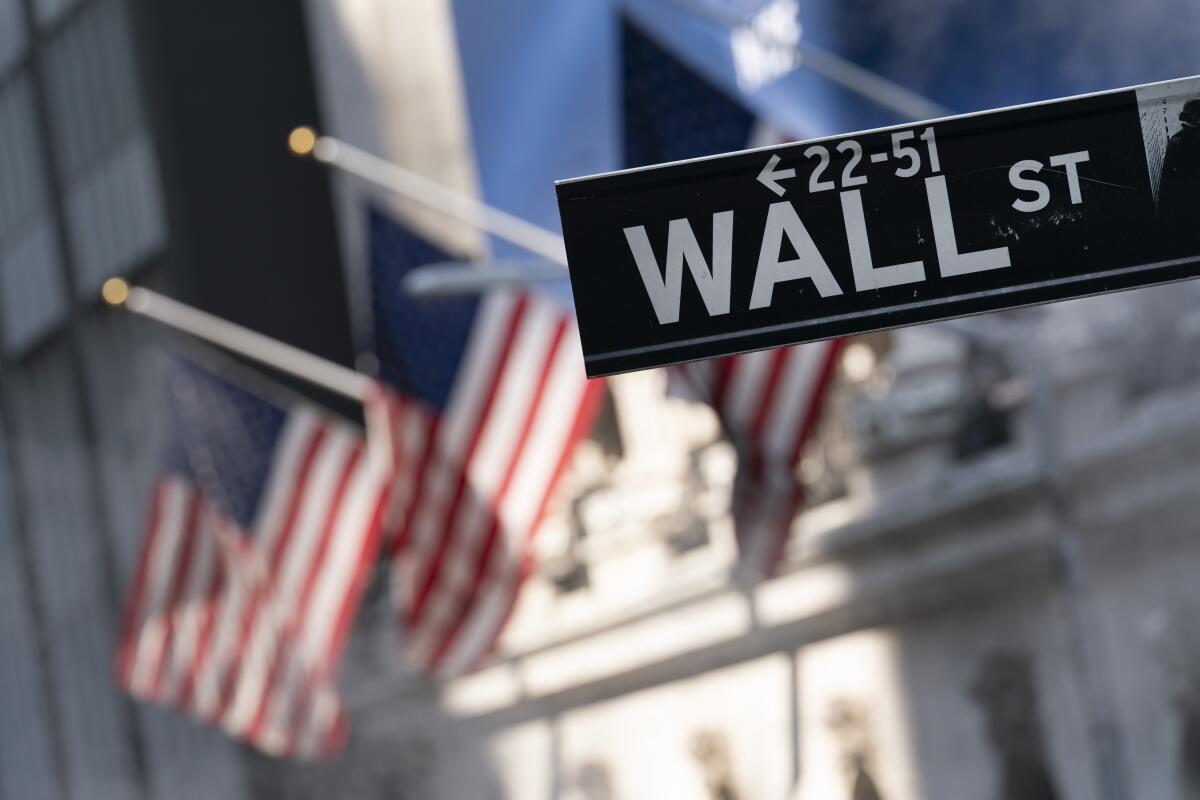A late slide pulls major U.S. indexes just below record highs

- Share via
The Standard & Poor’s 500 and Dow Jones industrial average closed slightly below their all-time highs Thursday as stocks gave up early gains and turned lower in the final minutes of trading on Wall Street.
The S&P 500 index slipped 0.3% a day after notching a record high. The Dow, which also set a new high Wednesday, fell 0.2%. The Nasdaq composite also lost 0.2%.
Most of Wall Street is on vacation or has closed out positions for 2021, which means trading was extremely light. Investors will probably not make any large moves until next week with the start of the new year.
“In general, more than any one bit of news the last few days, people are focused really on what’s coming ahead over the course of the next 12 months,” said Alonso Garza, global investment specialist at J.P. Morgan Private Bank.
The S&P 500 fell 14.33 points to 4,778.73 and the Dow slid 90.55 points to 36,398.08. The Nasdaq dropped 24.65 points to 15,741.56. Smaller-company stocks also weakened slightly, though the dip left the Russell 2000 index barely changed. The index slipped 0.45 points, or less than 0.1%, to 2,248.79.
The major stock indexes are on pace to end December with solid gains, capping a banner year for the market. The S&P 500 is headed for a gain of more than 27% for 2021. That would be its best performance since 2019, another standout year for the market.
As the variant spreads, businesses across California are rethinking return-to-office timelines and scrambling to cope with lost productivity.
A wave of consumer demand fueled by the reopening of the economy pumped up corporate profits more than expected this year, which helped keep investors in a buying mood. The Federal Reserve also helped by keeping interest rates low, which makes borrowing money more affordable for companies and consumers.
The market’s gains came despite no shortage of economic challenges, including higher inflation, global supply chain disruptions and outbreaks of more contagious variants of the coronavirus.
Investor concerns about the Omicron variant have eased in recent weeks after researchers said it appears to cause less severe symptoms and President Biden avoided announcing travel or other restrictions that might weigh on economic activity. Still, markets are uncertain about the effect of Omicron, which is spreading fast and is quickly becoming the dominant variant.
Technology companies accounted for a big share of the late-afternoon slide. Micron Technology led the sector decline, dropping 2.4% after disclosing that its memory chip output has been hindered by a lockdown in the Chinese city of Xi’an intended to contain the Omicron variant.
Energy stocks and a mix of companies that rely on consumer spending also weighed down the market. Oil and natural gas company APA fell 3%. Tesla slid 1.5% after announcing it is recalling certain Model 3s because a cable for its backup camera can become worn and fail to transmit images to the dashboard console.
Cruise lines fell after the Centers for Disease Control and Prevention recommended that passengers avoid cruise travel, regardless of their COVID-19 vaccination status. Norwegian Cruise Line slid 2.6% and Carnival dropped 1.3%.
The Centers for Disease Control and Prevention is warning people not to go on cruises, regardless of their vaccination status, because of onboard outbreaks fueled by Omicron.
Healthcare and communication services stocks notched gains. Pfizer rose 1.4% and Twitter climbed 4%.
Investors got a couple of bits of good news. The number of Americans applying for unemployment benefits fell below 200,000, more evidence that the job market remains strong in the aftermath of last year’s coronavirus recession. Wall Street will get the December jobs report next week.
Meanwhile, the Chicago purchasing managers’ index, a gauge of manufacturing and economic activity, came in at 63.1 for December. That’s slightly better than the reading of 62.0 that economists were expecting, according to FactSet.
The yield on the 10-year Treasury note edged lower to 1.51% from 1.54% the day before.
More to Read
Inside the business of entertainment
The Wide Shot brings you news, analysis and insights on everything from streaming wars to production — and what it all means for the future.
You may occasionally receive promotional content from the Los Angeles Times.












